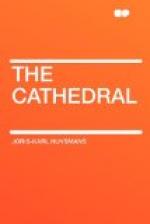And Durtal pondered over these reflections which assailed him every time he happened to take up a clerical journal or one of the Manuals introduced by some prelate’s note of approval, like a clean bill of health.
He could never get over his amazement at the incredible ignorance, the instinctive aversion for art, the type of ideas, the terror of words, peculiar to Catholics. Why was this? For after all there was no reason why believers should be more ignorant and stupid than any other folks. Indeed, the contrary ought to be the truth.
Whence did this inferiority proceed? And Durtal could answer himself. It was due to the system of education, to the training in intellectual timidity, to the lessons in fear, given in a cellar, far from a vital atmosphere and the light of day. It really seemed as if there were some intention of emasculating souls by nourishing them on dried-up fragments, literary white-meat; some set purpose of destroying all independence and initiative in the disciples by levelling them, crushing them all under the same roller, and restricting the sphere of thought by maintaining a deliberate ignorance of art and literature.
And all merely to avert the temptation of forbidden fruit, of which the idea was suggested under the pretext of inspiring dread of it. By this method curiosity with regard to the veiled unknown tormented their young brains and excited their senses, for it was always in the background, and in a form all the more dangerous because it had the effect of a more or less transparent gauze. The imagination could not fail to exasperate itself by cogitating its desire to know and its fear of knowing, and it was ready to fly off at the least word.
Under these circumstances the most anodyne book was a source of danger from the simple fact that love was alluded to, and woman depicted as an attractive creature; and this was enough to account for all—for the inherent ignorance of Catholics, since it was proclaimed as the preventive cure for temptations—for the instinctive horror of art, since to these craven souls every written and studied work was in its nature a vehicle of sin and an incitement to fall.
Would it not really be far more sensible and judicious to open the windows, to air the rooms, to treat these souls as manly beings, to teach them not to be so much afraid of their own flesh, to inculcate the firmness and courage needed for resistance? For really it is rather like a dog which barks at your heels and snaps at your legs if you are afraid of him, but who beats a retreat if you turn on him boldly and drive him off.
The fact remains that these schemes of education have resulted, on the one hand, in the triumph of the flesh in the greater number of men who have been thus brought up and then thrown into a worldly life, and on the other, in a wide diffusion of folly and fear, an abandonment of the possessions of the intellect and the capitulation of the Catholic army surrendering without a blow to the inroads of profane literature, which takes possession of territory that it has not even had the trouble of conquering.




